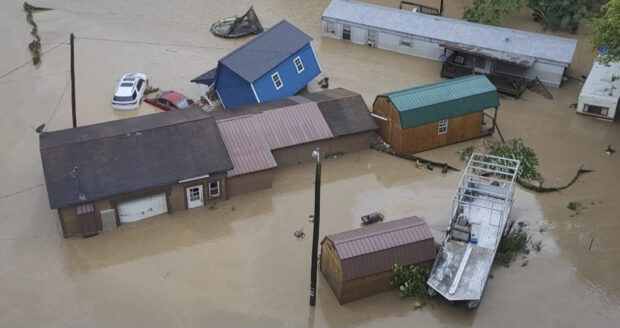Real estate interests and insurance companies that administer National Flood Insurance Program policies are heaving a sigh of relief after Congress approved a last-minute deal to temporarily fund the federal government, keeping the NFIP in business — but only until Nov. 17.
The 45-day funding move averted what the National Association of Realtors had called a “harmful lapse” that would have jeopardized as many as 1,300 real estate closings every day of a government shutdown.
“We are thankful Congress came together in a bipartisan way to avert this shutdown, but our work isn’t over. This is a short-term extension, and we will be right back here in November,” the National Association of Realtors’ chief advocacy officer said in a statement.
“Write Your Own” flood insurance companies, such as Wright National Flood Insurance, which offers NFIP policies as well as its own private flood products, were sweating it last week before the funding deal was struck.
Companies like Neptune Flood, which mostly sell their own, private flood insurance products, were expecting to see a significant bump in sales if the federal flood insurance program was suspended.
“But we’d still prefer that the government did not shut down,” said Trevor Burgess, CEO of the St. Petersburg-based Neptune.
A flood of new business could bring its own complications, including a need to secure more reinsurance, which has soared in price this year, Burgess said Friday. “We can help for about 90 days, but after that we have to have a conversation with our reinsurers to increase capacity,” he added.
The firm had lots of inquiries from insurance agents last week as the shutdown seemed likely.
Neptune, one of the largest private flood insurers in the country with some 166,000 policies in force, already has seen a 20 percent increase in sales in the year since Hurricane Ian hit Florida. Ian brought storm surge and inland flooding to a region where relatively few property owners had carried flood insurance.
During the last federal government shutdown, which lasted for about 35 days in 2018, Neptune was much smaller, making the impact of an NFIP suspension “just a blip on the screen. Now, we’re much larger,” Burgess said.
If Congress is unable to reach agreement on longer-term government funding before the Nov. 17, private flood insurers will no doubt see an increase in business, said Craig Poulton, of Poulton Associates, which offers flood and catastrophe insurance. But repeated shutdowns, as seen in recent years, could also prompt some insurers to decide that administering NFIP policies is not worth the hassle, he noted.
Even if lawmakers come to agreement on a federal spending bill this year, questions remain about longer-term NFIP reauthorization. U.S. Sen. John Kennedy said last week that the Senate had blocked his effort to fund the flood insurance program for another three months.
And a temporary funding fix won’t take care of everything, including some flood claims. NFIP has only $2.4 billion set aside to pay claims, and the East and Gulf Coasts are still in hurricane season, AM Best reported in a statement.
“Once that money runs out, no more claims will be paid,” the rating firm noted. “Although the U.S. is past peak hurricane season, October storms are numerous. Hurricane Michael (Florida Panhandle, 2018) and Superstorm Sandy (2012) both occurred in October. A storm of similar magnitude could exhaust current NFIP funding on existing policies.”
Flood insurance has taken on new importance in recent months, as climate change brings wetter storms and more rainfall events across the country, experts have said.
“Much of the floods we see today are basically sourced from rainfall. In the past it was rising rivers and storm surge,” said John Dickson, president and CEO of Aon Edge, a managing general agent that writes flood policies around the U.S. “And it turns out that it can rain anywhere.”
He noted that a government shutdown will help expand the private flood insurance market, nationwide, and he expects the market to double in size in the next few years.
In the meantime, though, brokers and insurance agents should be prepared for a shutdown on Nov. 17.
“Producers, they’re on the front lines,” Dickson said. “And they need to be aware of their options and should be having those conversations with their clients now and not wait until Nov. 17.”
Top photo: Flooding after heavy rains in August, in Chesapeake, W. Va. (Bob Aaron/WCHS-TV via AP)





















 Reinsurance Program Could Wipe Out Need for Calif. FAIR Plan: Legal Exec
Reinsurance Program Could Wipe Out Need for Calif. FAIR Plan: Legal Exec  AI Claim Assistant Now Taking Auto Damage Claims Calls at Travelers
AI Claim Assistant Now Taking Auto Damage Claims Calls at Travelers  Focus on Ski Guides After Deadly California Avalanche Could Lead to Criminal Charges, Civil Suits
Focus on Ski Guides After Deadly California Avalanche Could Lead to Criminal Charges, Civil Suits  Why Claims AI Build vs. Buy Decisions So Often Miss the Mark
Why Claims AI Build vs. Buy Decisions So Often Miss the Mark 




